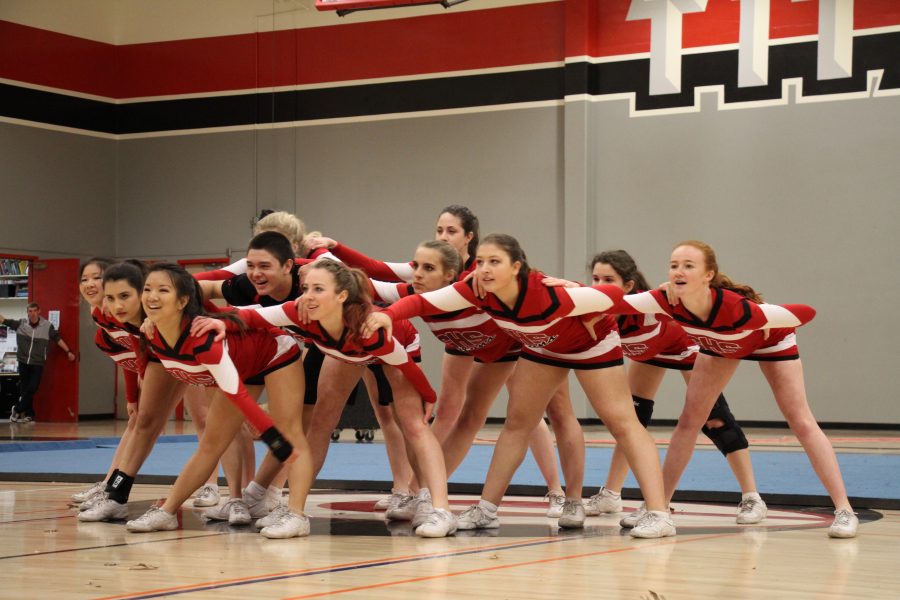Written by Shawna Chen
The Student Executive Council (SEC) members announced the administration’s decision to cancel the Paly Rally in online class groups on Jan. 21. The message cited lack of time as a reason for not holding the rally, along with concerns about appropriateness in light of the Board of Education’s new policy on sexual harassment, nondiscrimination and bullying.
In December, the Board of Education passed a new policy on sexual misconduct and harassment, which tightened the the definition of harassment and bullying while prioritizing equality and safety for all groups of students on campus. SEC was informed of these changes at the start of the new semester, and administrators asked SEC members to revise the Paly Rally tradition to follow the new policies.
“It wasn’t us saying, ‘You can’t do that,’” Principal Dr. Denise Herrmann said. “It was that our whole district has taken that stance, and it’s our job as administrators, when policies change, to inform people who they’ll impact.”
According to Student Activities Director Lisa Hall, the Paly Rally, which would have taken place this year on Thursday, Jan. 28, began as a rally specifically for drumming up spirit and interest for Palo Alto High School (Paly)-Gunn basketball games. In the past, senior boys would dress as Paly cheerleaders and perform some of Paly’s cheers at the rally.
Since Hall arrived at Gunn in 2005, the Paly Rally has consistently remained an issue because of problems of appropriateness with dancers, their outfits and behaviors.
Each year, Hall would proof the routine with an administrator, watching a run-through and approving costumes and performance based on what they saw. Students, however, would not always have costumes prepared in person, which became part of the challenge, Hall says. “They’d describe the costume as if it were there; we’d approve it based on what we’d heard,” she said. “Then oftentimes, it would be not what we had expected.”
Loose interpretation served as another obstacle. Hall says students were told not to be overly provocative or sexualized, but everybody interpreted that differently.
“What it comes down to at this point is: what is the purpose of this particular piece of the rally?” Hall said. “The rally has changed significantly. So are we doing a rally that’s supposed to be for drumming up school spirit for a big game or are we doing a rally so that a few select people can get up and do something they think is funny?”
Once administrators gave SEC its instructions to align with Board policy, SEC Student Body President senior Isabelle Blanchard says the Council began discussing possible revisions. Blanchard says there was talk of moving away from “shooting down Paly and more towards upping Gunn” with focus on details such as switching colors of dress from Paly’s white and green to Gunn’s red and black or having rally dancers perform with cheer instead of alone.
“We were going to have them go through a similar screening process that we’d decided we’d use in future Night Rallies after this year, where they’d submit a video of their routine or watch it live and review it in SEC and with admin to see what changes needed to be made,” Blanchard said. “That was our plan moving forward—to continue having a rally for it, but to make adjustments to how we checked everything and make stricter guidelines for what they could wear and what they could do.”
SEC’s expectation, however, had always been that its members would be the ones making the decision on Paly Rally. “Originally, when [Assistant Principal Miriam] Stevenson came in and presented the Board policy, what it seemed like to SEC was that there was a policy that we needed to follow and we couldn’t keep things the way they were,” Blanchard said. “But it was to our understanding that it was possible to then do something as long as it followed the Board policy. It was a surprise when the admin came back to us and kind of gave us a flat-out no.”
On Jan. 19, the leadership team, which includes Hall, administrators, Mental Health & Wellness Coordinator Joanne Michels, the five Teachers on Special Assignments and athletic director Curtis Johansen, revisited the issue. Hall reported SEC’s plans, but Herrmann says “there was no choreography, no dress code, no nothing.”
Not only was the rally an issue of accountability—administrators could not ensure that what students said they would or wouldn’t do would actually happen—but it also became a “doability” issue. “I want to set students up for success, and it felt like we were almost setting students up to be doomed to not meet the policy,” Herrmann said.
Even if individuals disagree with the Board policy, Herrmann says it trumps everything. “We don’t get to decide, ‘Oh wouldn’t it be nice to do this a couple more times?’ after the Board has said, ‘This is our sandlot. We have to operate within the sandlot,’” she said. “Whatever any of us think individually, once the School Board has decided on a policy, it has to be followed, and as a public school, we have to protect the rights of those few students who might find [the dance] very offensive, and the law requires us to do that.”
Board policies are enforced for all school-sponsored events and require Herrmann to ensure that any on-campus activity is planned with the law in mind. “I think that when we point out guidelines to students if they’re trying to make a decision and they ignore them until the eleventh hour, it’s not going to allow us as administrators who are responsible for both what goes on in the classroom and co-curricularly to do our job, which is to make sure we’re not allowing something to go forward that we know could violate that policy,” she said.
Hall says a number of other factors played into the administrative team’s decision to cancel the rally. The most prominent was time. This year’s Paly-Gunn sports games were much earlier in the semester than they had been in past years. “The first Paly-Gunn game was on Jan. 8, and usually they’re much later,” Hall said. “That limited our time and ability to negotiate and make changes.”
A solution would have been created, Hall says, if SEC had been given more time to plan. “I think we would’ve eventually been able to come up with something that was acceptable both to the students and the administration,” she said. “Just given the timing of the event and the necessity for us to make sure that the changes that needed to happen occur, the administration said we’re going to make the decision in this case.”
Nonetheless, administrators believe the rally dance tradition has had its time at Gunn. “The leadership team and administrators felt that over time the Paly Cheerleader tradition has lost its original purpose and now has little to no connection to the basketball game itself and the purpose of building school spirit around athletics,” Hall said. “It’s not inclusive as it’s only senior boys, and there have been issues with the costuming choices in that they do not take into consideration the feelings and reactions of all of our student groups.”
A lot of changes would need to happen for SEC to create a strong vetting process and ensure that the dance is in accord with the current culture of our school, Hall says. “So we need to come up with something, that no matter what students do, whether that’s airbands or a brand new event, there still needs to be an appropriate vetting process so we can be inclusive of all people,” Hall said.
Blanchard says most SEC members understand why the administration made its decision but hopes that in the future administrators will maintain clearer communication with SEC. “We just wish we had been consulted into the conversation more and that they had come to us before making a final decision,” she said. “I understand that Board policies are getting really strict and we have some issues with Board policy in the district, but personally, what I find upsetting is that SEC understood where they were coming from and was willing to compromise and work out over time something that would follow all the rules. SEC is capable of finding something that would’ve worked for everyone, but we weren’t really given the chance to show that.”
“I understand that Board policies are getting really strict and we have some issues with Board policy in the district, but personally, what I find upsetting is that SEC understood where they were coming from and was willing to compromise and work out over time something that would follow all the rules. SEC is capable of finding something that would’ve worked for everyone, but we weren’t really given the chance to show that.” —Student Body President senior Isabelle Blanchard
Treasurer senior Kellen Liu, too, believes that the decision should have been made by students. “I think the decision making behind it is flawed,” he said. “I don’t think the Paly Rally, even if it seems like it, is based on mockery. It’s supposed to be something that’s funny and enjoyable, for people to laugh about. It’s something the school, especially the senior class, looks forward to every year.”
Though Liu understands the administration’s concerns about how the tradition seems to degrade Paly, he says in recent years the rally has become a Gunn spirit event for the sole purpose of increasing enthusiasm for sports games. “Last year, there wasn’t any green,” he says. “We’re not trying to mock Paly or any part of it anymore; we’re just trying to have a fun event.”
Site Council member senior Grace Park, however, disagrees with Liu’s sentiment. Even if some students saw the event as funny and not a big deal, an underlying layer of unintentional sexism exists. “The difference is if girls did the exact same routine dressed in the exact same clothes in the same setting, they would be seen as inappropriate,” she said. “Most of the student body just sees the dance routine as good fun, but if they saw where the routine originated, what it means, and the whole context of the rally, they’d realize that it doesn’t fit everything else we’ve been doing for the past year.”
It is true that a lot of changes have been implemented on campus this year, Park says, but she and Hall both believe that we should not be holding tightly to traditions simply because they’re traditions. “A lot of people are uncomfortable with the amount of change Gunn has dealt with, and they don’t want to change yet another familiar, beloved routine,” Park said. “But just because this tradition is comforting to some doesn’t mean it’s comfortable for everyone, and I don’t know if a couple of laughs are worth breaking board policy.”
The fact that Paly does not hold a similar Gunn Rally on campus is another problem with the Paly Rally tradition, Park says.
According to Paly School Board representative senior Emma Cole, Paly students were a bit shocked when the Paly Rally was brought up in her student government class. “Mainly because Paly doesn’t have a Gunn Rally, it felt to students like it was one school calling out another,” Cole said.
Though most students were not personally offended by the Paly Rally’s existence, Cole says that through her experience with the Paly administration’s removal of on-campus traditions such as streaking, she believes some traditions aren’t always benefitting the student body and the student body should move on when it is time to do so. “Sometimes administration can’t rely on students to change a long held tradition, and if they need something they may have to make that decision themselves,” she said.
While Hall acknowledges that students have a legitimate right to be angry about not being a part of the final decisionmaking process, she hopes students will also recognize how necessary time and care are in such cases like the Paly Rally. In the future, the Paly Rally could return, even if the Paly dance component does not. Either way, Hall asks all students to seriously consider why we keep or change events and traditions. Is it inclusive? Is it truly promoting equality? Will it benefit future students? “We want to make sure we’re celebrating all of our teams,” she said. “We want to share the love.”











